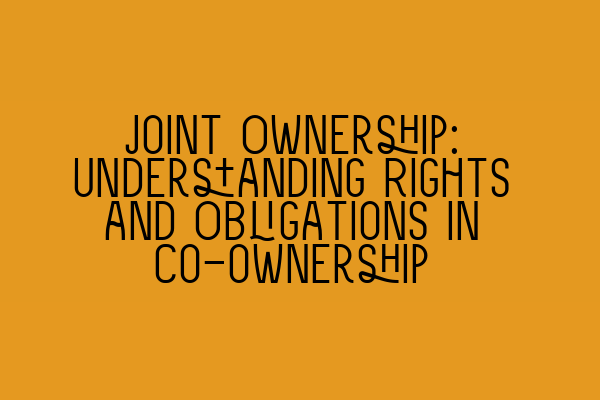Joint Ownership: Understanding Rights and Obligations in Co-ownership
When it comes to property ownership, many individuals choose to enter into joint ownership arrangements. Joint ownership allows multiple individuals to co-own a property, whether it be residential or commercial, and share in its benefits and responsibilities. However, understanding the rights and obligations associated with joint ownership is crucial to avoid any potential conflicts or misunderstandings.
Types of Joint Ownership
Joint ownership can take various forms, each with its own set of rights and obligations. The three most common types of joint ownership are:
- Tenants in Common
- Joint Tenancy
- Tenancy in Common
Tenants in Common
When property owners choose to be tenants in common, each individual holds a distinct and separate share of the property. They can own equal or unequal shares, and these shares can be sold, gifted, or inherited independently of one another. In the event of one owner’s death, their share will not automatically pass to the other owner(s), but instead, it forms part of their estate.
Joint Tenancy
Joint tenancy, on the other hand, involves co-owners holding an undivided and equal interest in the property. There is a right of survivorship in joint tenancy, meaning that if one owner passes away, their interest automatically passes to the surviving owner(s). This ensures that the property remains with the surviving owner(s) without the need for probate or other legal proceedings.
Tenancy in Common
Tenancy in common is similar to joint tenancy, but with one key distinction: there is no right of survivorship. Each co-owner holds a distinct and divisible share of the property. In the event of one owner’s death, their share will pass according to their will or the laws of intestacy.
Rights and Obligations of Co-owners
As co-owners, individuals have certain rights and obligations that they need to be aware of:
- Right to Occupy: Co-owners have the right to occupy the property and use it in accordance with the terms of their ownership agreement.
- Decision-making Power: Joint decisions concerning the property, such as selling, leasing, or making improvements, require the unanimous agreement of all co-owners. It is important to establish clear guidelines on decision-making processes to avoid conflicts.
- Contributions and Expenses: Co-owners are responsible for their proportional share of expenses related to the property, such as mortgage payments, repairs, and maintenance.
- Right to Rent or Sell: In some cases, co-owners may have the right to rent or sell their share of the property independently, subject to any restrictions outlined in the ownership agreement.
Dissolving Joint Ownership
There may come a time when co-owners wish to dissolve their joint ownership arrangement. This can happen for various reasons, such as a breakdown in relationships or a change in financial circumstances. In such cases, the co-owners may need to seek legal advice to navigate the process of partitioning or sale of the property.
Seek Professional Advice
Joint ownership arrangements can be complex, and it is always advisable to seek professional legal advice before entering into any co-ownership agreement. A solicitor specializing in property law and land law can help you understand the legal implications, draft a clear ownership agreement, and ensure that your rights and obligations are properly protected.
Related Articles:
- SQE 1 Practice Exam Questions
- SQE 1 Practice Mocks FLK1 FLK2
- SQE 2 Preparation Courses
- SQE 1 Preparation Courses
- SRA SQE Exam Dates
